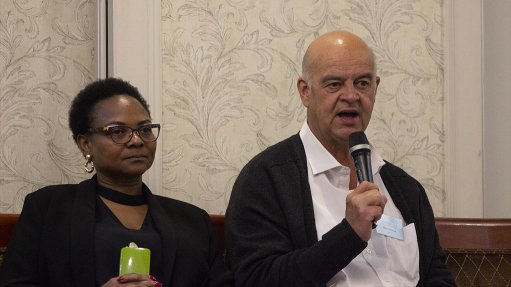
Nelisiwe Magubane and Mike Rossouw
Photo by: Creamer Media's Darren Parker
Economic growth in South Africa could lead to more load-shedding, with beleaguered utility Eskom unable to meet higher demand, Matleng Energy Solutions chairperson and Eskom board member Nelisiwe Magubane said on Wednesday.
She was speaking at Afriforesight’s Future of Coals and Bulk Commodities Conference, in Johannesburg.
This warning was reiterated by Independent Energy thought leader CEO Mike Rossouw, who noted that demand had decreased in recent months, enabling it to avoid load-shedding.
Rossouw posited that the problems at Eskom were the result of “a completely incorrect” pricing policy.
He indicated that its current policy was suitable in the past when the utility was of a smaller scale and not investing as much on new power generation plants.
However, he said, Eskom did not presently have the required revenue to pay for its scale of operations – which was 500% bigger compared with its scale in 2001 – nor did it generate enough revenue to support the new plants it was building.
Therefore, Eskom could not just raise electricity tariffs, as demand would still be insufficient to raise the required revenue to cover its costs.
Rossouw stressed that pricing and demand were connected. He noted that industry and mining houses were paying the majority of Eskom’s revenue; however, they were being overcharged.
For example, smelters have about 60% of their costs set for electricity, and therefore, even a small price increase in electricity has a considerably negative effect on their operations and business.
This, he noted, resulted in them having to shut down their operations or move their operations to other countries where they receive better prices.
He said Eskom could not present itself as being cost competitive compared to other countries by merely looking at its average price of electricity.
Rather, for an accurate comparison, it should consider the energy price being paid by its densest users, and compare that with others countries’ prices for the same, Rossouw suggested.
He lamented that the focus on fixing Eskom was on addressing the symptoms, rather than the root cause of pricing policy.
However, he noted that should this problem be addressed, the utility’s challenges could be resolved, without the need for long-drawn-out Parliamentary processes.